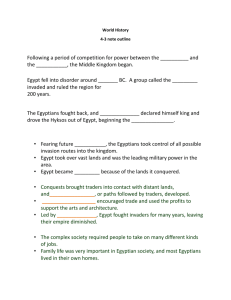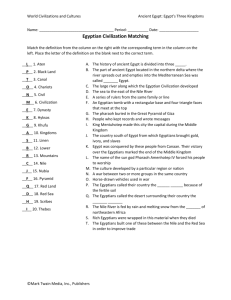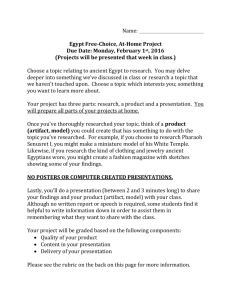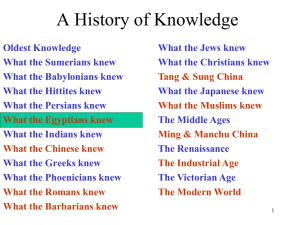Address by Dr
advertisement
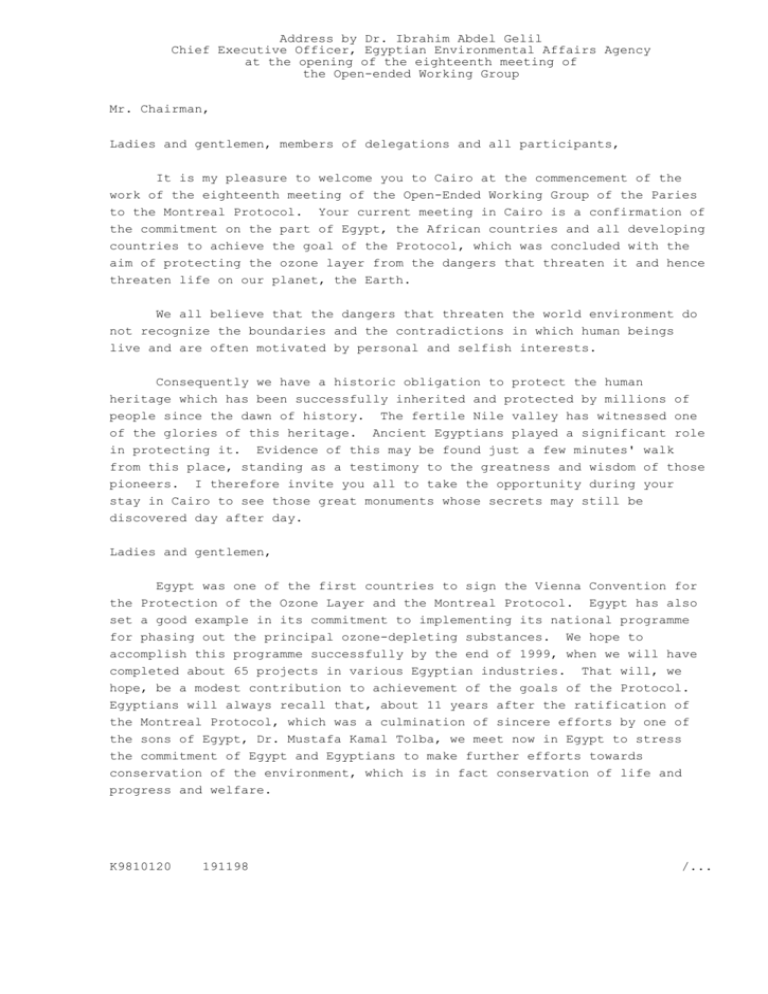
Address by Dr. Ibrahim Abdel Gelil Chief Executive Officer, Egyptian Environmental Affairs Agency at the opening of the eighteenth meeting of the Open-ended Working Group Mr. Chairman, Ladies and gentlemen, members of delegations and all participants, It is my pleasure to welcome you to Cairo at the commencement of the work of the eighteenth meeting of the Open-Ended Working Group of the Paries to the Montreal Protocol. Your current meeting in Cairo is a confirmation of the commitment on the part of Egypt, the African countries and all developing countries to achieve the goal of the Protocol, which was concluded with the aim of protecting the ozone layer from the dangers that threaten it and hence threaten life on our planet, the Earth. We all believe that the dangers that threaten the world environment do not recognize the boundaries and the contradictions in which human beings live and are often motivated by personal and selfish interests. Consequently we have a historic obligation to protect the human heritage which has been successfully inherited and protected by millions of people since the dawn of history. The fertile Nile valley has witnessed one of the glories of this heritage. Ancient Egyptians played a significant role in protecting it. Evidence of this may be found just a few minutes' walk from this place, standing as a testimony to the greatness and wisdom of those pioneers. I therefore invite you all to take the opportunity during your stay in Cairo to see those great monuments whose secrets may still be discovered day after day. Ladies and gentlemen, Egypt was one of the first countries to sign the Vienna Convention for the Protection of the Ozone Layer and the Montreal Protocol. Egypt has also set a good example in its commitment to implementing its national programme for phasing out the principal ozone-depleting substances. We hope to accomplish this programme successfully by the end of 1999, when we will have completed about 65 projects in various Egyptian industries. That will, we hope, be a modest contribution to achievement of the goals of the Protocol. Egyptians will always recall that, about 11 years after the ratification of the Montreal Protocol, which was a culmination of sincere efforts by one of the sons of Egypt, Dr. Mustafa Kamal Tolba, we meet now in Egypt to stress the commitment of Egypt and Egyptians to make further efforts towards conservation of the environment, which is in fact conservation of life and progress and welfare. K9810120 191198 /... - 2 Environmental conservation has become one of the pillars of national activities in Egypt, and one of the necessities of sustainable development aimed at securing a better future for millions of Egyptians. Our agenda for this meeting is full of subjects which will require us to make extensive efforts to complete our work before submission to the tenth meeting of the Parties. The work of your committee has always been characterized by a spirit of cooperation and mutual understanding, in recognition of the magnitude of the issue being dealt with, which has far-reaching implications on development efforts all over the world. It has been proved that human society is always required to strive harder to understand all the interactions and interconnected relationships that govern the planetary system. It is also incumbent on us always to study the negative environmental effects of human activities as a prerequisite for achieving sustainable development. Those relationships will ultimately have an impact on the important relationship between the global environmental conventions, and the best example of that is the need to study the expected effects of the implementation of the Kyoto Protocol on the Montreal Protocol and its objectives. Ladies and gentlemen, We have still a very long way to go to achieve all the aspirations of the peoples of the world in creating a clean environment for present and future generations. A spirit of teamwork through full understanding of the principle of common but differential responsibility would constitute a step forward in this endeavour. In this context we would like to emphasize that it is important that our partners in industrialized countries stress their commitment to continue to support the Multilateral Fund so as to enable developing countries to fulfil their obligations. I would like to note that the Fund is considered a success story in the history of international environmental relations. It is my pleasure to thank the Chairman and members of the Executive Committee for their efforts to assist developing countries in fulfilling their obligations under the Protocol. In conclusion, I am pleased to welcome you again to our centuries-old city and wish you a pleasant stay. I would like to remind you once again of the need to acquaint yourselves with our civilizations, of which we are proud, and with the story of the struggle of Egyptians to achieve progress, construction and peace. -----



